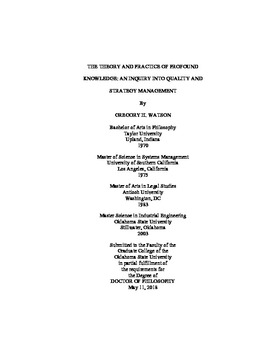| dc.contributor.advisor | DeYong, Camille F. | |
| dc.contributor.author | Watson, Gregory H. | |
| dc.date.accessioned | 2019-03-25T21:59:33Z | |
| dc.date.available | 2019-03-25T21:59:33Z | |
| dc.date.issued | 2018-05 | |
| dc.identifier.uri | https://hdl.handle.net/11244/317773 | |
| dc.description.abstract | This research develops a theory of profound knowledge, derived from the quality dialog between Walter A. Shewhart and W. Edwards Deming. In 1992, Deming introduced his system of profound knowledge as the mechanism by which executives could make organizationally transforming decisions to implement strategic change. He coupled this theory with the Deming Cycle, which represented a change in the Japanese PDCA Control Cycle, focusing on learning and improvement rather than on work process analysis and control. These changes were enigmatic because Deming did not provide academic citations for his system, linkage to his prior theories, or operational definitions for the terms he used. Instead, Deming implied that his prior theories should be perceived as a natural outgrowth of this new system. Thus, the system of profound knowledge only represents a framework for further consideration and not a serious advance in quality thinking. | |
| dc.description.abstract | This research investigates the sources of Deming's system, related to a thinking experiment that he had been conducting with Shewhart since the late 1920s when they first met and began a lifelong association. The nature of their symbiotic thinking is described, and literature is cited to trace the evolution of the four elements in Deming's system from their nascent beginning in the 1870s, when logical positivism and pragmatism began to influence scientific thinking and merged with probabilistic theory for conducting investigations. Shewhart contributed the core concepts for Deming's system in his theory of control, and his statistical process control methods; however, a host of academics and researchers from such diverse fields as psychology, philosophy, statistics, physics, economics, and engineering contributed related ideas that are integrated into the comprehensive approach to quality which is described here as the theory of profound knowledge. | |
| dc.description.abstract | This research performs two sequential inquiries. First, it develops a scientifically appropriate theory of profound knowledge based on a grounded research analysis of the historical thinking pathways which developed each of the four elements, defining a general model describing the manner in which this theory operates. Second, it uses an expert panel to review and validate the proposed theory and establish its potential for practical application. | |
| dc.format | application/pdf | |
| dc.language | en_US | |
| dc.rights | Copyright is held by the author who has granted the Oklahoma State University Library the non-exclusive right to share this material in its institutional repository. Contact Digital Library Services at lib-dls@okstate.edu or 405-744-9161 for the permission policy on the use, reproduction or distribution of this material. | |
| dc.title | Theory and practice of profound knowledge: An inquiry into quality and strategy management | |
| dc.contributor.committeeMember | Case, Kenneth E. | |
| dc.contributor.committeeMember | Kamath, Manjunath | |
| dc.contributor.committeeMember | Rossler, Paul E. | |
| dc.contributor.committeeMember | Kennison, Shelia M. | |
| osu.filename | Watson_okstate_0664D_15728.pdf | |
| osu.accesstype | Open Access | |
| dc.type.genre | Dissertation | |
| dc.type.material | Text | |
| thesis.degree.discipline | Industrial Engineering and Management | |
| thesis.degree.grantor | Oklahoma State University | |
